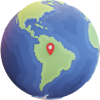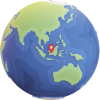Case studies are organised by region, with each region featuring links to the countries where the case studies are located.
Colombia

In Santander, a region of Colombia, corruption is a common practice in the timber industry. Timber traders will exploit the regulatory, police, and judicial systems in order to enable the illegal trafficking of wood. Government agencies, such as the Autonomous Corporation of Santander (CAS) and the Corporation for the Defense of the Bucaramanga Plateau (CDMB), which are responsible for regulating timber extraction, have become riddled with corruption. Officials within these bodies have been found to issue false permits, recycling old ones and creating fake licences to launder illegally sourced timber. Police officers, bribed by the criminal organisations, frequently allow trucks carrying illegal timber to pass through checkpoints. In addition to this, the judicial system is also compromised, with prosecutors being influenced by bribes to exploit procedural loopholes. This allows seized timber to be returned to traffickers. An example of this corrupt behaviour is the Los Ingenieros criminal network’s use of intermediaries. These individuals will manage the logistics of illegal timber transport, securing false permits, and connecting loggers with buyers. Businessmen in major cities including Bogotá or Bucaramanga purchase timber through these intermediaries. This corruption has led to widespread deforestation in natural reserves such as Yariguíes National Park, while key figures often evade punishment.
Keywords: Latin America, Colombia, timber, primary production, trade and transport, corruption and bribery, serious organised crime, illegal timber trade, illegal logging, fraudulent documentation, deforestation
Sources: https://insightcrime.org/investigations/colombia-purveyors-illegal-wood/

The Colombian peace process left a power vacuum in rural areas formerly controlled by FARC, leading to increased deforestation and environmental damage due to the lack of government oversight. Criminal groups have exploited this situation by engaging in illegal timber trafficking, amongst other environmental crimes. The Colombian Ministry of the Environment estimates that 47% of the timber sold nationally is illegally sourced. A 2020 investigation also found irregularities in Colombian timber exports, including over-invoicing and under-invoicing to move value in and out of the country. Logging operations often occur in protected areas of the forest, despite licences indicating authorised zones. Overall, the illegal logging of timber in Colombia causes 10% of all deforestation. Another issue is that existing regulations are only weakly enforced. For instance, the environmental authority of Corpoamazonia, responsible for protecting forests in the southern departments, is understaffed, with just 30 officers overseeing an area the size of Ecuador. In addition, the Transport Handbook, a permit required for cutting and transporting timber in Colombia, is frequently falsified in order to launder illegal timber. Merchants exploit these permits as blank cheques to justify volumes logged in protected forests.
Keywords: Latin America, Colombia, timber, primary production, trade and transport, illegal timber trade, illegal logging, fraudulent documentation, illegal deforestation, trade misinvoicing
Sources: https://ojo-publico.com/921/how-timber-trafficking-operates-colombia#:~:text=Although%20the%20authorities%20point%20to,of%20illegal%20timber%20is%20traded
https://gfintegrity.org/wp-content/uploads/2020/03/IFFs_Enviro_Final_eng.pdf
Côte d'Ivoire

Ivory Coast’s market regulator, under the leadership of Yves Brahima Kone, is planning to introduce measures to curb fraud related to fair-trade certified cocoa contracts. The Coffee and Cocoa Council (CCC) suspended sales of fair-trade certified contracts after recording an exponential increase in certified cocoa. Buyers and co-operatives have been using this program to push multinational companies into overpaying. To combat fraudulent contracts, the regulator is considering limiting the number of cocoa buyers to 30 from over a thousand. Next year, Ivory Coast will introduce a new certification and traceability system to align with European regulations on the import of commodities linked to deforestation.
Keywords: Sub-Saharan Africa, Côte d'Ivoire, cocoa, fairtrade fraud, deforestation
Source: Ivory Coast's regulator weighs options against fraudulent cocoa certification (timeslive.co.za)
Guatemala

A Guatemalan palm oil company, linked to an oil spill into Guatemala's Pasion River and to numerous human rights abuses, has been charged with corruption and fraud. According to Friends of the Earth, Reforestadora de Palma S.A. (RESPA) was involved in an immense fish kill along the Pasión River in 2015 due to pollution from their processing plant, affecting 12,000 people. The company was charged with "ecocide" but the ruling was not enforced after the murder of a key plaintiff, Indigenous leader Rigoberto Lima Choc. Subsequent investigation revealed REPSA’s involvement in several illegal activities such as corporate corruption and environmental mismanagement. Such issues are systemic in Guatemala, where corruption is high, with REPSA being amongst nine companies other charged with influence peddling and bribery. Four high-level executives, including directors Hugo and Juan Milton Molina Botrán, face arrest orders. In addition, REPSA is also allegedly involved in several human rights abuses, rampant in Guatemala’s palm oil sector. Despite the devastating impact of this scandal, the Rainforest Action Network reported in 2021 that Cargill and Nestlé had quietly resumed sourcing palm oil from REPSA. These commercial ties were suspended following the 2018 arrest of REPSA executives, but have since resumed.
Keywords: Latin America, Guatemala, palm oil, primary production, corruption and bribery, human rights violations
Sources: https://www.ran.org/press-releases/cargill-nestle-resumed-palm-oil-sourcing-in-guatemala-despite-legacy-of-violence-and-intimidation-advocates-find/
Honduras

Cattle can both themselves be laundered (if they are grazed on land that has been illegally cleared and converted to pasture) and used as a means of laundering criminal proceeds from other exploits, like drugs trafficking. In Brazil, cattle have been laundered to obscure their links to land clearing, when they are moved from ranches that have contributed to land conversion through “clean” ranches that have not resulted in recent forest loss.
In 2009, several Brazilian slaughterhouses signed the Terms of Adjustment of Conduct, an initiative of the Federal Prosecution Office and the Public Commitment on Cattle Ranching, and a voluntary protocol developed by Greenpeace, which precludes them from purchasing cattle reared on deforested land. However, a single cow might pass through up to 10 farms before it is slaughtered (from birth, through rearing and fattening). Any of these farms might be linked to illegal deforestation but many slaughterhouses assess links to deforestation only on the last farm a cow passes through - their direct supplier. As long as the last farm in the supply chain is from a “clean” ranch that is free from recent deforestation then slaughterhouses (and subsequent transporters and retailers, like supermarkets) are likely to mark them as deforestation-free, even if they have spent the majority of their life on and have passed through nine other ranches that have been converted from forested land. Indeed, data indicates that some ranchers own both “dirty” and “clean” ranches and launder cattle through their own properties. So long as one property is kept clean, they can continue to clear land for cattle grazing purposes on any number of other ranches.
Other investigations by Global Witness have found that ranchers have fraudulently edited the boundaries of their ranch once they have cleared areas of land, so that this land conversion is no longer included within the property’s scope and the ranch appears free from deforestation. This is alleged to be the case for the Fazenda Espora de Ouro II Ranch in Brazil’s Pará state, which Global Witness also found appears to be registered in the name of an individual who could not legally be its owner (based on assessment of a database of land titles and beneficiaries).
Cattle can also – and concurrently – be used as a means of laundering the proceeds of illicit activity. Drug traffickers – especially in Colombia (where the traceability of beef produce is particularly poor), Honduras, and Guatemala – are known to launder revenue from drugs by buying or grabbing land which they convert into pasture for cattle, which they also purchase with narcotrafficking proceeds. When the cattle are sold, profits are hard to trace back to the drug network and their illicit proceeds are effectively laundered. This practice, known as “narco-ranching”, is suspected of contributing up to 87% of deforestation in the Maya Biosphere Reserve, a large UNESCO heritage area of forest which covers over 2 million hectares of rainforest across northern Guatemala and borders other protected forests in Mexico and Belize. The Reserve is highly vulnerable to deforestation by crime groups due to its strategic location along a significant drug trafficking route up through Guatemala and Mexico leading to the US.
Cattle ranching in such areas also frequently serves to hide airstrips and production facilities used by traffickers to produce and transport drugs or other illicit products. Airstrips now pepper the Maya Biosphere reserve, which are used by planes coming in from Colombia and Venezuela with cocaine to be smuggled across the border into Mexico.
Keywords: Latin America, Honduras, primary production, money laundering, illegal deforestation, human trafficking, serious organised crime
Source: https://www.vox.com/science-and-health/2022/10/19/23403330/amazon-rainforest-deforestation-cattle-laundering

Illegal timber and drug trafficking are closely intertwined in northeastern Honduras, particularly in the town of Dulce Nombre de Culmí. The nearby forests of pine, mahogany, and cedar feed a timber trade worth around $60-80 million between 2016 and 2018. However, environmental agencies warn that 50-60% of this trade comes from illegal logging, much of it from the country’s northeastern natural reserves where drug trafficking is also prevalent.
Culmí is the last settlement before entering the Río Plátano Biosphere, a protected forest where drug trafficking and illegal logging have crossed paths for over a decade. The mountains and plains surrounding Culmí are dotted with clandestine airstrips, many built during the drug boom a decade ago. These airstrips, carved from the dense forests in the area, were then used to sell wood to timber traffickers and drug trafficking groups.
In Olancho, Yoro, and Gracias a Dios—three departments renowned for their timber production—drug trafficking groups are known to engage in timber trafficking. Groups of farmers, often migrants from the poorest areas of southern Honduras, settle in unpopulated lands in and around the Río Plátano Biosphere. There, they harvest wood illegally, often with protection from corrupt officials and politicians, as well as support from drug trafficking groups.
The wood is usually cut without securing official permission from Honduras’ Institute of Forest Conservation. It is then combined with legal shipments, mostly at the sawmills, either by falsifying logging permits or bribing police responsible for monitoring timber transport. Meanwhile, illegally harvested precious woods, such as mahogany and cedar, usually head north along clandestine routes to the department of Gracias a Dios, and from there to processing hubs such as La Ceiba. These are the same routes that drug shipments travel along.
Keywords: Latin America, Honduras, timber, primary production, drug trafficking, illegal logging, illegal timber trade, fraudulent documentation, corruption and bribery
Source: https://news.mongabay.com/2021/04/drugs-and-agriculture-cause-deforestation-to-skyrocket-at-honduran-unesco-site/
Indonesia

According to Earth.org, a monitoring exercise by Indigenous peoples and local communities in Indonesia has revealed widespread fraud and forgery in the country's “certified legal” timber industry. The Indonesian Independent Forest Monitoring Network (JPIK) and PPLH Mangkubumi found numerous cases of illegal logging, record manipulation, forged export certificates, and bribery. Illegal practices were discovered throughout the supply chain, from logging companies to woodworking shops and exporters. Firstly, it was found that logging companies were cutting down trees outside their legally permitted concessions. These trees were tagged with legality certificates to falsely declare that the wood came from within the permitted areas. In North Maluku's Central Halmahera district, logging companies used legal documents from local landowners to cover illegally logged timber. Some companies even paid locals to perform illegal logging on their behalf, thereby distancing themselves from direct involvement. In terms of exports, several exporting companies in Central Java sold forged legal documents, known as v-legal certificates, to furniture companies lacking required certificates. This fraud enabled the export of uncertified wood products. These forged certificates were sold for 2 million to 8 million rupiah ($140 to $560) per container, making it a lucrative illegal business.
Keywords: South East Asia & Pacific, Indonesia, timber, primary production, Indigenous rights, illegal logging, fraudulent documentation
Sources: https://earth.org/indonesias-legal-timber-industry/

According to Mongabay, two major Indonesian pulp and paper producers allegedly engaged in fraudulent activities to evade taxes. The companies, PT Toba Pulp Lestari (TPL) and Asia Pacific Resources International Holdings (APRIL), are accused of mislabeling exports to China, falsely declaring high-value dissolving pulp as lower-value paper-grade pulp. This misclassification enabled them to report lower revenues and reduce their tax liabilities in Indonesia. Mongabay details how, from 2016 to 2018, APRIL produced 830,000 tons of dissolving pulp and exported 90% of it to China. However, none of these exports were recorded in Indonesian customs as dissolving pulp. This alleged misclassification may have reduced APRIL’s revenue by up to $242 million and avoided $60 million in taxes. Ultimately, the fraudulent activities contributed to significant tax revenue losses for Indonesia, amounting to $168 million between 2007 and 2018.
Keywords: South East Asia & Pacific, Indonesia, timber, trade and transport, tax evasion, trade misinvoicing
Sources: https://news.mongabay.com/2020/12/pulp-paper-toba-pulp-lestari-april-tax-export-report/#:~:text=TPL%20and%20APRIL%2C%20two%20major,China%2C%20a%20new%20investigation%20alleges

Mongabay reports that Indonesian prosecutors have charged three major palm oil companies, Permata Hijau Group, Wilmar Nabati Indonesia, and Musim Mas, with corruption related to a cooking oil shortage in 2022. It was revealed that executives from these companies had bribed a trade ministry official to secure export permits for their crude palm oil. These permits allowed the companies to bypass the government-imposed domestic market obligation (DMO) and domestic price obligation (DPO). The DMO required companies to allocate a certain quota of palm oil for the domestic market to ensure supply during the shortage. The DPO capped the selling price of palm oil domestically to keep it affordable for consumers. Overall, the company’s fraudulent behaviour allowed them to sell palm oil abroad at higher prices rather than adhering to domestic price caps and quotas intended to address the shortage. This corruption caused state losses estimated at 6.47 trillion rupiah ($432 million). The executives and the official have already been convicted and jailed, with sentences recently extended.
Keywords: South East Asia & Pacific, Indonesia, palm oil, primary production, trade and transport, corruption and bribery
Sources: https://news.mongabay.com/2023/06/palm-oil-giants-face-corruption-charges-as-indonesia-probe-widens/


The Environmental Crimes Financial Toolkit is developed by WWF and Themis, with support from the Climate Solutions Partnership (CSP). The CSP is a philanthropic collaboration between HSBC, WRI and WWF, with a global network of local partners, aiming at scaling up innovative nature-based solutions, and supporting the transition of the energy sector to renewables in Asia, by combining our resources, knowledge, and insight.


